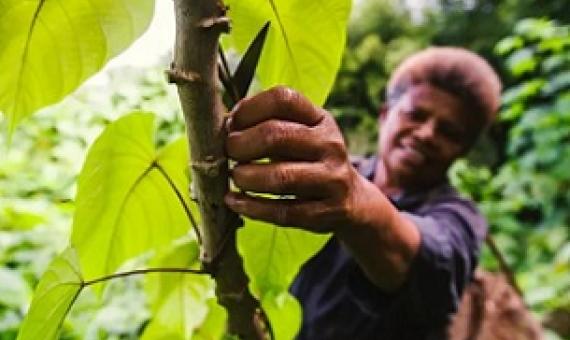Scientists often study the grim impacts of losing wildlife to hunting, habitat destruction and climate change.
The Policy Implications of the Dasgupta Review: Land Use Change and Biodiversity
The “Dasgupta Review” of the economics of biodiversity (Dasgupta 2021) identifies many factors that threaten the ecological sustainability of our economies. This article examines how two policy failures - the underpricing and underfunding of nature – influence global land use change and terrestrial biodiversity loss. If natural areas are priced too cheaply, then converting them to agriculture, forestry and other land uses is less costly than protecting or preserving habitats. Underfunding nature further reduces the incentives for conservation and restoration.
In Vanua Levu, the second largest island of Fiji, every contour drips with green. The landscape is impossibly lush and verdant.
Becoming Generation Restoration - Ecosystem Restoration for People, Nature and Climate
The world is facing severe challenges. Billions of people around the world are suffering the consequences of the climate emergency, food and water insecurity and the COVID-19 pandemic. Ecosystems are an indispensable ally as we meet these challenges. Protecting them and managing their resources in a sustainable manner is essential. But just increasing the protection and sustainable management of our remaining natural landscapes and oceans will not be enough, the planet's degraded ecosystems and the huge benefits that they provide must also be restored.
Risk‐sensitive Planning for Conserving Coral Reefs under Rapid Climate Change
Coral reef ecosystems are seriously threatened by changing conditions in the ocean. Although many factors are implicated, climate change has emerged as a dominant and rapidly growing threat.Call Number: [EL]Physical Description: 10 p.
Climate Change, Coral Reef Ecosystems, and Management Options for Marine Protected Areas
Marine protected areas (MBA) provide place-based management of marine ecosystem through various degrees and types of protective actions. Habitats such as coral reefs are especially susceptible to degradation resulting from climate change, as evidenced by mass bleaching events over the past two decades.
Tuvalu State of Environment Report 2022
The Tuvalu State of Environment Report presents an overview across four thematic areas: Environmental Governance, Coastal and Marine, Atmosphere and Climate, and Built Environment. The report uses the 'Drivers, Pressure, State, Impact and Response' model to describe the environment, As far as possible the report is based on quantitative data relating to the state of the environment, supplemented by stakeholder input to describe casual relationships and environmental effects.
Ecosystem and socio-economic resilience analysis and mapping (ESRAM) : Solomon Islands, Volume 1 : introduction and national assessment
This report presents Volume 1 (of three volumes) prepared as part of the Solomon Islands Ecosystems and Socio-economic Resilience Analysis and Mapping (ESRAM) to assess and prioritise climate change-related ecosystem-based adapation options for selected locations in Solomon Islands. Volume 1 provides the generic project background and methodology relevant to all three volumes, together with the high level national scale assessment.Available onlineCall Number: [EL]ISBN/ISSN: 978-982-04-0757-2,978-982-04-0758-9 Physical Description: p 141.
Nature-based solutions valuation report - June 2021
As climate change, disrupts local economies, ecosystems and biodiversity in Latin America and the Caribbean, implementing effective solutions is paramount. Over the last decade, UNDP has worked with countries to deploy Nature-based solutions (NbS) as an approach to meeting these multiple interconnected challenges while enhancing jobs and livelihoods and providing other socio-economic and ecosystem service benefits. Call Number: [EL]Physical Description: 72 p.
Pacific Island biodiversity, ecosystems and climate change adaptation: building on nature's resilience + CD - tools and case studies
The combined pressures of climate change and development will not only aggravate existing challenges to the conservation of biodiversity in the Pacific, but also introduce new difficulties. There are a wide range of historical, current and planned studies that examine specific aspects of the relationship between climate change, conservation and development in the Pacific.

